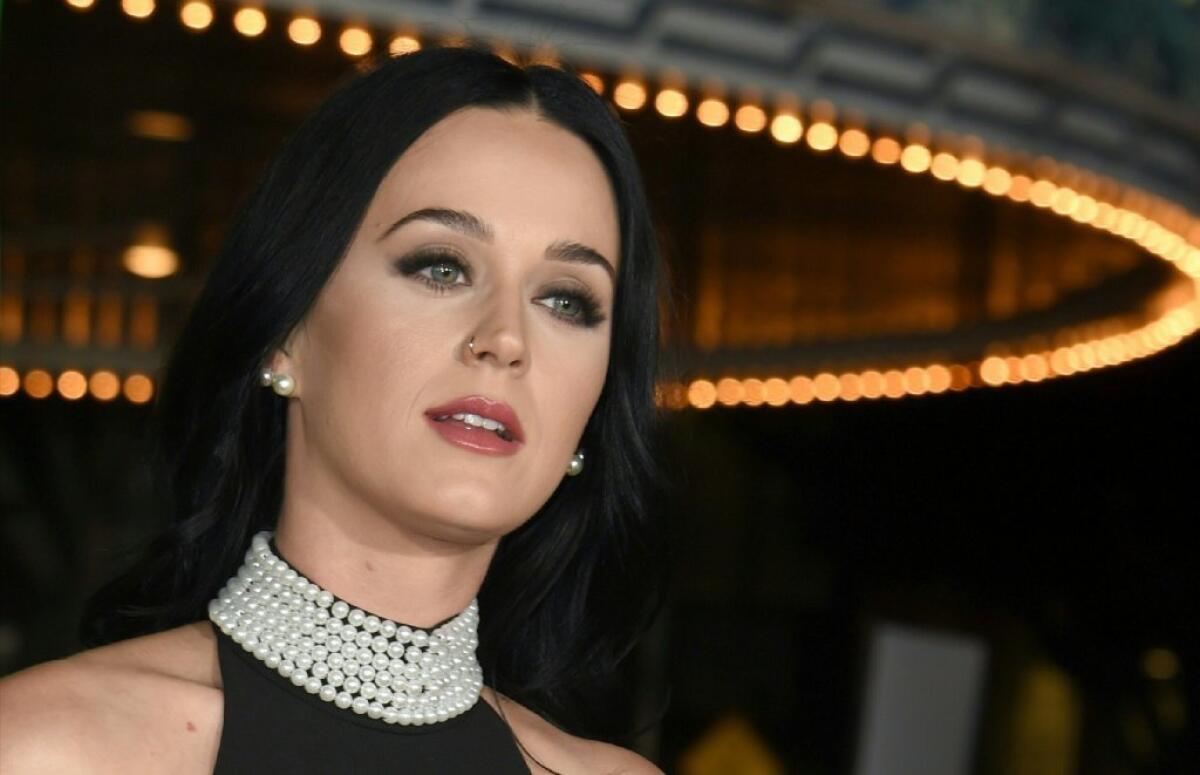Katy Perry lends her support to pro-Muslim American PSA

- Share via
On Jan. 21, Grammy-nominated singer Katy Perry will join a growing number of celebrities and women marching on Washington to oppose President-elect Donald Trump’s inauguration. Ahead of the national event she’s also lending her star power and her pocketbook to “#DontNormalizeHate,” a short-film PSA posted to YouTube that draws parallels between Trump’s anti-Muslim rhetoric and the mass incarceration of 120,000 Japanese American citizens during World War II.
The PSA asks one simple question: Is history repeating itself?
Perry executive-produced the powerful public service announcement, which shares the true story of 89-year-old Haru Kuromiya, a native of Riverside, who was a girl when her family was forced to leave their homes and submit to mass incarceration by order of the American government — an act of prejudice and fear that remains an ugly stain on U.S. history.
“My entire family was put on a registry,” she recalls, before a potent twist lends the PSA an urgent relevance. “Our constitutional rights were taken away from us.”
Codirected by filmmakers Aya Tanimura and Tim Nackashi, the #DontNormalizeHate PSA landed the early support of director Spike Jonze and actor-activist George Takei. But it was Perry whom Tanimura credits for making the short possible. In need of financing to cover the costs of prosthetics materials to commission a custom-made mask, the filmmakers called Perry, who gave them a blank check.
“Katy has always been a champion of the underdog, of minorities, of the people who are kind of left of center, and she’s become more politically involved in the last few election cycles,” said an appreciative Tanimura,
Tanimura, a filmmaker of Japanese and Australian descent who’s worked with recording artists Charlie Puth (“Dangerously”), Alessia Cara (“How Far I’ll Go” from Disney’s “Moana”) and Perry (directing the lyric videos for “Roar,” “Unconditionally” and “Birthday”), had felt a rising sense of panic while watching a Trump presidential campaign punctuated by volatile rhetoric about women, Muslims and minorities.
“Trump has created an atmosphere of fear for Muslim Americans in the United States,” Tanimura said. “The accountability and responsibility for what you say and do now has been lifted so people feel a little freer to be racist, or act upon racism, because there are not necessarily consequences for it — it’s just acceptable behavior. If laws are put in place to back that up, it will be pretty scary.”
On the campaign trail, for example, Trump called for “a total and complete shutdown of Muslims entering the United States,” inciting fear of a Muslim American population that, he claimed in a statement that remains posted on his website, held “hatred beyond comparison” for the rest of the country.
The possibility of Trump ordering a Muslim registry has been looming over the lives of the Muslim American population since, while increased harassment and intimidation of minorities were reported in nearly every state in the days following the election. (Trump’s camp has since distanced the president-elect from the controversial proposal. But neither he nor his Secretary of State nominee, Rex Tillerson, speaking at his Senate confirmation hearing Wednesday, has gone on record to rule it out.)
The sentiment is not unfamiliar to those with good memories.
“The Japanese race is an enemy race,” asserted Lt. Gen. John DeWitt, the U.S. Army general who wasn’t alone in loudly advocating to order Japanese Americans into concentration camps on baldly racist grounds. “And while many second- and third-generation Japanese born on United States soil, possessed of United States citizenship, have become ‘Americanized,’ the racial strains are undiluted.”
On Feb. 19, 1942, President Franklin D. Roosevelt , signed Executive Order 9066 authorizing his war command to round up all people of Japanese ancestry and detain them in military camps, bounded by barbed wire and armed guards, in the name of national security.
Entire families were uprooted, losing their homes, possessions and businesses in the process. First, they were assigned to “assembly centers” before being sent to internment camps across the country to live in cramped barracks under inhumane conditions, prisoners at home in America. More than 60% of “relocated” Japanese Americans were born in the United States.
Tanimura brainstormed the PSA with Oscar-nominated special effects guru Tony Gardner (“127 Hours,” “Adaptation”), who crafted the custom prosthetics makeup out of his Alterian Inc. studio in Irwindale. She and Nackashi partnered with Asian American nonprofit Visual Communications, got crews to donate time to shoot the piece, and cast Hina Khan, a Los Angeles-based actress of Pakistani heritage.
“Casting a Muslim actress was nonnegotiable,” said Tanimura.
With support from politically active celebrities like Perry, who shared the PSA on Thursday with her 155.2 million followers on Twitter and Instagram, Tanimura and Nackishi are hoping their message reaches a wide audience at a pivotal time in America.
“I think like a lot of us who are terrified of Trump’s ideals and policies, she is too,” Tanimura said of Perry. “And this is one instance where she’s able to help educate someone — even one person — on the horrors of the past and what could potentially be repeated.”
More to Read
Only good movies
Get the Indie Focus newsletter, Mark Olsen's weekly guide to the world of cinema.
You may occasionally receive promotional content from the Los Angeles Times.








